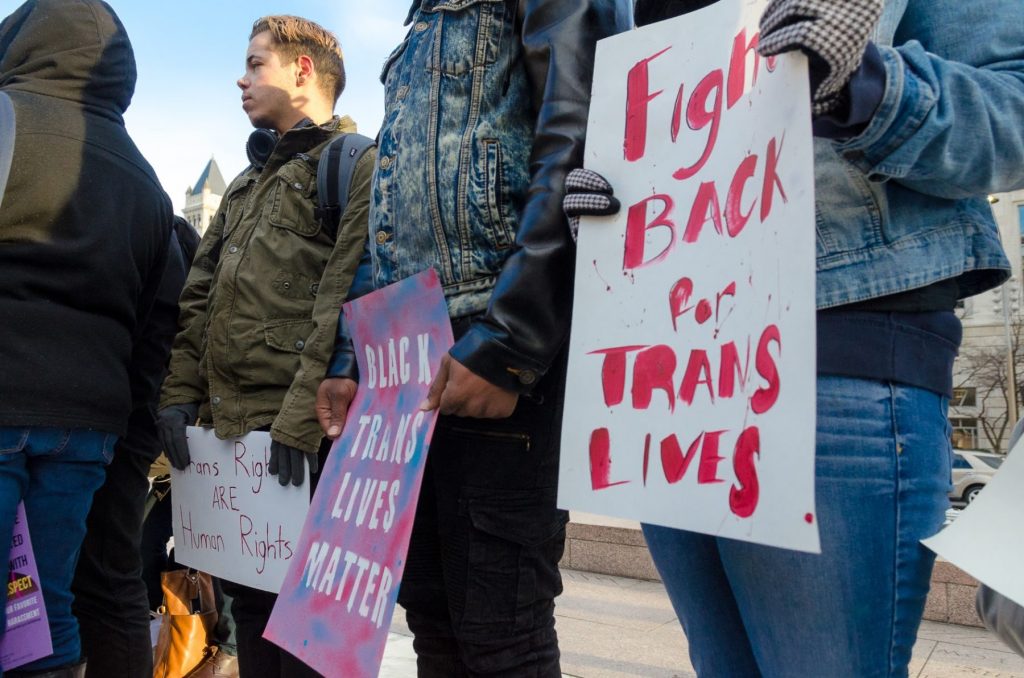Image from Lauryn Guitierrez/Rewire
Wednesday, news broke that the U.S. department of Health and Human Services (HHS) plans to extend “protections” to healthcare workers who refuse to treat transgender patients. This policy is a religious exemption from civil rights protections—that is, protections intended to prevent underserved patients from being denied care. Religious exemptions from duties of life-saving care position a very expansive construction of religious freedom as inviolable, but transgender people’s right to life as subject to the whim of the individual provider.
As a health equity advocate, my job is to help healthcare professionals overcome biases that stop them from giving adequate care. I work with clinicians and non-clinical staff who haven’t been given enough training in LGBTQIA+ and other underserved community skills, but have a commitment to the value that all of our patients deserve dignified and competent care. But cultural competency skillbuilding only helps when providers actually want to give good care. What happens when they won’t give care at all? Whenever I talk about this problem outside healthcare contexts, someone will invariably explain to me that healthcare workers don’t care about your gender and will always treat everyone, so it’s just a big red herring.
It’s not.
When Naya Taylor asked her regular doctor for transition-related care, her doctor refused—even though the requested service was within the scope of the clinic’s normal services. Later, Taylor was told “we don’t have to treat people like you.” Taylor was the first to sue under the protections afforded by the Affordable Care Act, which expanded existing anti-discrimination policy to transgender patients. Taylor passed away before the end of her case.
Shane Morgan tried to access prescription antibiotics for a urinary tract infection, but clinic staff told him they felt uncomfortable treating a patient like him—a man with a beard and a vulva. Instead of asking about his symptoms, clinic staff grilled Morgan about his genitals. Ultimately, they gave him an over-the-counter treatment and told him to leave. Denied the antibiotics he needed, Morgan developed a kidney infection, which can be life-threatening.
Jay Kallio’s doctor failed to tell him that his breast tissue biopsy came back with indications of cancer because the doctor felt unsure about what pronouns to use. Instead of facing down his own discomfort, Kallio’s surgeon let his disabled patient go on unaware that he had an aggressive cancer. As a result,
Kallio missed the window during which chemotherapy would have been effective. He spent the rest of his life advocating for patients’ rights.
Tyra Hunter was in a serious car accident at age 24. Paramedics cut her clothing as they extracted her from the damaged vehicle. When they saw her penis, the paramedics stopped rendering aid, instead standing back and mocking the young woman until she died. The paramedics were ultimately found to have violated human rights law.
According to a 2011 study by the National Center for Transgender Equality and the National Gay and Lesbian Task Force, 19 percent of trans people in the US have been refused care outright because they were trans. This is not a hypothetical problem. This is a very real problem that disrupts access to healthcare for millions of people—and for some people, it’s a matter of life and death.
Rolling back protections for transgender patients puts trans people at an even higher risk of medical discrimination, which disproportionately impacts trans people who are already more likely to face medical discrimination, including immigrants and people of color. It empowers bigots to discriminate in their workplace with impunity. It further connects to other trans protection rollbacks; the Trump administration has reversed anti-discrimination protections for trans workers and students, and there have been overtures toward reversing existing protections for trans inmates, such as the guideline that a transgender prisoner’s safety should be “strongly considered” when determining whether to house them with men or women.
These changes brutally enable the widespread practice of abuse against imprisoned trans people, and will make it even harder for those people to get justice or care. Corrections officers and prisoners are nine times more likely to sexually harass or assault transgender inmates than cisgender inmates, and prison employees often deny prisoners access to medical care, even after inmates have been victims of serious violence. Prisoners like the trans and gender-nonconforming inmates of California’s Chowchilla Women’s Prison, who filed a lawsuit earlier this month alleging that prison employees subjected them to physical and sexual abuse and denied them medical care. This parallels other cases such as those filed by Jules Williams, Strawberry Hampton, Michalle Wright, Jessica Sunderland, Vanessa Adams, and Eyricka King.
Anti-transgender policy is framed as upholding freedom of religion and freedom of conscience. More and more, the US is replacing civil rights protections with protections for people whose conscience would lead them to abuse, neglect, and humiliate transgender people; who would drive us out of public spaces and deny us vital services; and ultimately, who would willingly let us die. The Trump administration deploys their concept of “freedom of religion,” which never seems to extend to Muslims, to excuse far-reaching anti-trans initiatives.
Han Koehle is a sociologist and medical equity advocate in Santa Barbara, California. They improve healthcare access for underserved groups through improved medical policy, clinic environment interventions, insurance advocacy, provider education, and patient counseling. Han researches transgender medical inequality and in the political and moral functions of humor.










